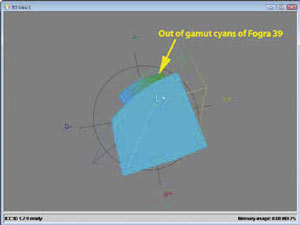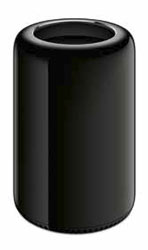articles/Review/iMac-Retina-5k-page2
The 27-inch iMac Retina 5k - part 2 of 1 2
by Mike McNamee Published 10/04/2015

The headline feature of the new machine is the 5K screen. It really looks most impressive with its 5,120x2,880 abundance of pixels and an eye-torching 400+ cd/m2 luminance. The detail is quite incredibly, better than the eye can see at comfortable working distance. There might still be a bit of work to do with all these pixels; our i1 Publisher GUI would not show all the screen and we had to keep scrolling around to work. The i1 itself interfaced without any hitches and initially we tried to use the basic program along with ADC. This was something of a disaster, delivering an average error of 12.3 ΔEoo and a maximum error of 16ΔEoo. Analysis of the data showed the overwhelming error component to be the luminance channel and so we went to Advanced mode, turned ADC off and set the luminance at a more realistic, fixed setting of 80 cd/m2. This delivered a much better error of just 1.21ΔE00 with a maximum of 4.6ΔEoo. We have added this value to others obtained from a standard iMac and our own Eizo and Dells. The constricted gamut of Retina is no improvement on the original iMac and, with a bare sRGB coverage, it leaves it well short of displaying the cyans of Fogra 39, the cmyk standard we use for Imagemaker. Even so it is better than its predecessor and quite usable for all but professional pre-press work. In practical studio use, inkjet prints off this set-up are always going to look rather dull when compared with the Monitor Avg Error flashy Mac screen, you just have to live with it or invest in an Eizo or NEC.

Overall this is an impressive piece of kit with great performance allied to expensive 'optional' extras and little in the way of upgrade potential. The neat appearance will rapidly be compromised in a working studio by the forest of wires required to make real-world kit talk to it, but it will play nicely with your iPad and iPhone if Facebook is an important part of your working day. If, however, you are interested in slide shows, Fusion, video editing or, in particular, 4K video editing then this is one toy you might consider for lower-end work. While the Mac system is regarded as having better facilities for video editing, the cost of storage for these vast files means that a standalone Windows workstation could be obtained at a more competitive cost. High-end gear for really serious video editing requires eye-watering Mac investments, the Apple Mac Pro (right, the one that looks like a catering tin of powdered milk) will set you back £5,539 before you add any storage while a Scan jobbie doing similar work can be had for £2,159 which is quite a bit less than even the iMac 5k Retina, even though you have to add a (colour accurate?) monitor and some storage.
Please Note:
There is more than one page for this Article.
You are currently on page 2 Contact Mike McNamee
1st Published 10/04/2015
last update 11/11/2019 11:46:30
More Review Articles
There are 0 days to get ready for The Society of Photographers Convention and Trade Show at The Novotel London West, Hammersmith ...
which starts on Wednesday 14th January 2026








